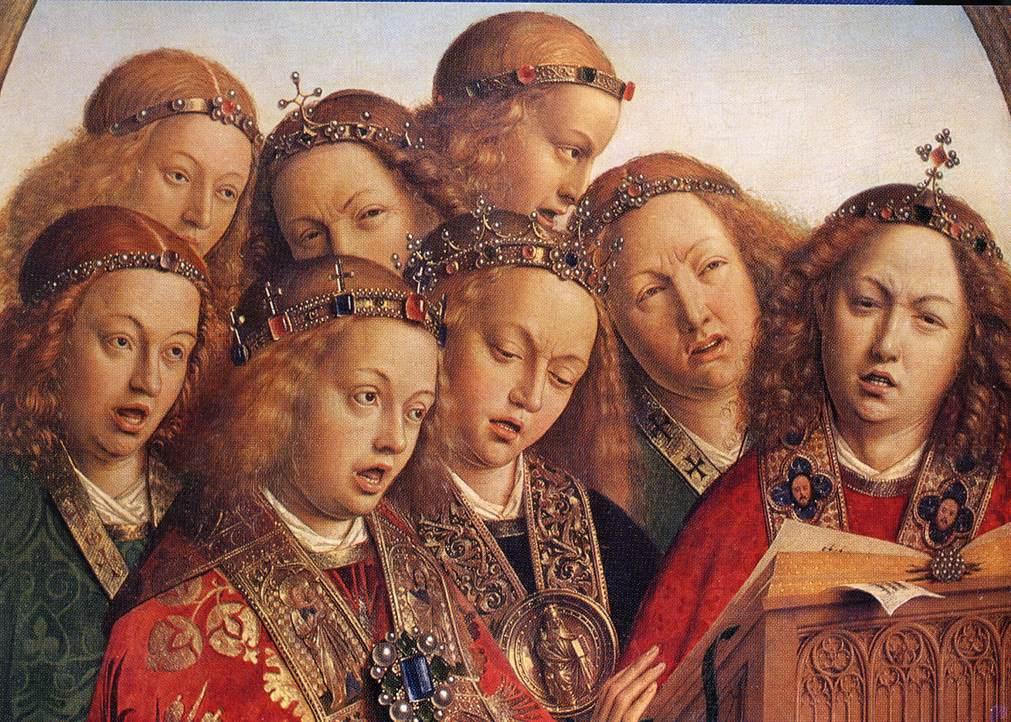The world recedes; it disappears! Heav'n opens on my eyes! my ears With sounds seraphic ring
These are the words of ‘The Dying Christian to his Soul‘ by Alexander Pope (set by Schubert in a translation by Herder, Verklärung, D 59). They are a surprisingly rare example of Schubert setting non-liturgical texts that evoke the sounds of a Christian Heaven.
In November 1822 Schubert composed Schwestergruß (D 762), setting a poem by his friend Bruchmann. Bruchmann’s sister Sybilla here appears as a ghost (she had died two years previously) and urges her brother to live well so that he can eventually share in the joys of heaven. Then,
In reiner Flamm Schwebt sie empor Ohne Schmerz und Harm Zu der Engel Chor. Into pure flames She glides upwards, Without pain or grief, Towards the angelic choir.
The implication in both of these texts (Pope and Bruchmann) is that the heavenly choir is inaudible to us mortals on earth. We can imagine such harmonies, but we cannot yet hear them.
Things are rather different with the Schiller texts that use a classical version of this imagery. The Olympian gods embody forces that we all know and interact with here in ordinary life. We do not need to die and go to heaven before we hear the voices of Mars and Venus (aka sex and violence). As the poet in Dithyrambe (D 47, D 801) greets Bacchus, Amor and Phoebus he asks,
Sagt, wie bewirt ich, Der Erdegeborne, Himmlischen Chor? Tell me, how can I entertain them, Someone like me, born on earth How can I host a heavenly choir?
However, he soon realises that there is no great difficulty. A combination of poetry and ‘nectar’ allows direct access to these great gods. Heaven is attainable here on earth.
In Die vier Weltalter (D 391) Schiller’s minstrel recounts how, in the age of Classical Greece (the time after ‘Scamander’, the Trojan War), the Muses sang in a heavenly choir.
Aus dem Kampf ging endlich der Sieg hervor, Und der Kraft entblühte die Milde, Da sangen die Musen im himmlischen Chor, Da erhuben sich Göttergebilde! Out of battle victory eventually emerged, And power blossomed into gentleness, The Muses then sang in a heavenly choir And at that time images of the gods were raised!
Again, these are gods who live within not beyond human experience. The heavenly chorus produced by the Muses is still audible to those who open themselves up to the arts of the classical world.
The Romantics of the generation after Schiller shared the belief of the classicists that sensitive souls could hear the harmony of a celestial choir even here within the limitations of earthly experience. Careful attention to nature itself would allow us to perceive the inherent harmony of creation. Schlegel’s Abendröte poems (https://www.schubertsong.uk/collection/schlegel-abendrote-putative-cycle/), which were actually written while Schiller was still alive, are based on this ‘Romantic’ sensitivity. The complexity and confusion of nature can be resolved into a single harmonious chord by a sensitive poet:
Alles scheint dem Dichter redend, Denn er hat den Sinn gefunden; Und das All ein einzig Chor, Manches Lied aus einem Munde. Everything appears to be speaking to the poet, Since he has discovered the meaning; And Everything is a single chorus, Many a song out of only one mouth. Schlegel, Abendröte (D 690)
Voices which are meaningless or empty on their own make sense and form part of the overall harmony when they take their place in the overall structure of things:
Aus göttlicher Quelle sind alle genommen. Ist jegliches Wesen nicht eines im Chore? All things are taken from a divine source. Is each being not one thing in the choir? Schlegel, Die Sterne (D 684)
☙
Descendant of:
MUSIC RELIGIONTexts with this theme:
- Dithyrambe, D 47, D 801 (Friedrich von Schiller)
- Verklärung, D 59 (Alexander Pope and Johann Gottfried Herder)
- Szene aus Faust, D 126 (Johann Wolfgang von Goethe)
- An die Freude, D 189 (Friedrich von Schiller)
- Die vier Weltalter, D 391 (Friedrich von Schiller)
- Die Sterne (Du staunest, o Mensch), D 684 (Karl Wilhelm Friedrich Schlegel)
- Schwestergruß, D 762 (Franz von Bruchmann)
- Auflösung, D 807 (Johann Baptist Mayrhofer)


